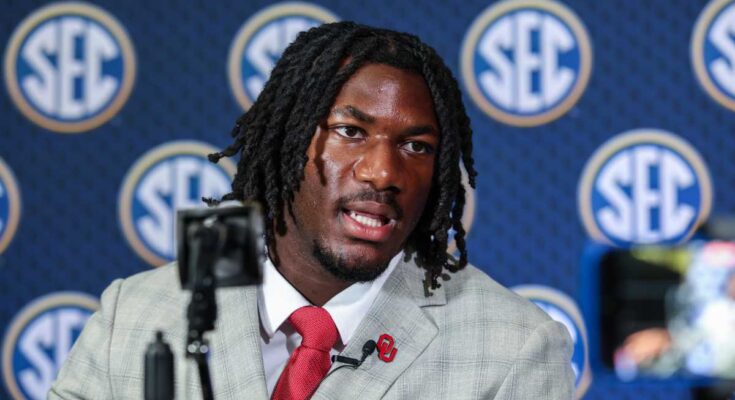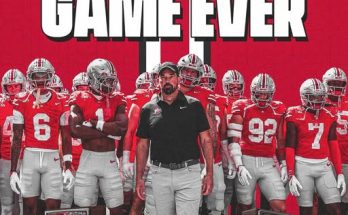Oklahoma Sooners’ R Mason Thomas Gets a Tough Lesson in SEC Dominance Over Big 12
The transition from the Big 12 to the SEC has never been easy, and Oklahoma Sooners’ standout defensive end R Mason Thomas learned that the hard way. After years of dominating in the Big 12, Thomas and the Sooners are now facing the brutal reality of life in the Southeastern Conference—where the competition is faster, stronger, and far more unforgiving. The difference isn’t just in talent but in the sheer physicality and relentless pace that defines SEC football. For Thomas, a player known for his explosiveness off the edge, the adjustment has been eye-opening, and his early struggles serve as a microcosm of Oklahoma’s larger challenge as they step into college football’s most demanding league.
Thomas arrived at Oklahoma as a highly touted recruit, expected to be a game-changer for the Sooners’ defense. In the Big 12, where high-flying offenses dominate and defensive play is often an afterthought, he thrived. His speed and agility made him a nightmare for opposing quarterbacks, racking up sacks and tackles for loss with relative ease. But the SEC is a different beast. Here, offensive linemen are bigger, quicker, and more technically sound. Running backs hit the hole with authority, and quarterbacks are far less likely to panic under pressure. In just a few games, Thomas has already seen firsthand why the SEC is considered the gold standard of college football.
One of the biggest adjustments for Thomas has been the level of physicality. In the Big 12, offensive schemes often rely on quick passes and spread formations, allowing defensive ends like Thomas to use their speed to disrupt plays. But in the SEC, power running games and pro-style offenses force defensive linemen to engage in brutal, snap-after-snap battles in the trenches. Thomas, who is used to chasing down quarterbacks, now finds himself constantly fighting off 320-pound tackles who can move just as fast as he can. The wear and tear is real, and the margin for error is razor-thin. One false step, and an SEC lineman will drive him five yards off the ball.
Another factor Thomas has had to contend with is the depth of talent in the SEC. In the Big 12, there might be one or two elite offensive linemen on a team, but in the SEC, nearly every starter is a future NFL prospect. There are no plays off, no weak links to exploit. Every snap is a battle against a player who could very well be playing on Sundays in a few years. For Thomas, that means refining his technique, improving his hand placement, and developing counter moves to avoid being neutralized play after play. The days of relying purely on athleticism are over—now, it’s about outsmarting and outworking opponents who are just as gifted.
The speed of the game is another adjustment. SEC offenses operate with precision and tempo, often forcing defensive linemen to process plays faster than they’re used to. Play-action passes look identical to run plays until it’s too late, and quarterbacks like Georgia’s Carson Beck or Alabama’s Jalen Milroe can extend plays with their legs, turning what should be a sack into a 20-yard gain. Thomas has had to become more disciplined in his pass rush, understanding that over-pursuing in the SEC means giving up explosive plays. In the Big 12, a missed assignment might result in a 10-yard completion—in the SEC, it can turn into a touchdown in the blink of an eye.
Beyond the on-field challenges, there’s also the mental aspect of playing in the SEC. The pressure is higher, the scrutiny is more intense, and the expectations are relentless. Every game feels like a must-win, and the fan bases treat even a close loss like a disaster. For a player like Thomas, who was accustomed to the more offense-friendly environment of the Big 12, the shift in mentality has been significant. There’s no hiding in the SEC—every weakness is exposed, every flaw magnified. The best players adapt, and Thomas is doing just that, but the learning curve is steep.
So, what does this mean for Oklahoma as a whole? The Sooners’ move to the SEC was always going to be a monumental challenge, and Thomas’ early struggles highlight just how different the league is compared to what they’re used to. Head coach Brent Venables has his work cut out for him, not just in recruiting players who can physically match up with SEC competition but in developing the mental toughness required to survive a grueling conference schedule. The days of outscoring opponents in shootouts are over—now, Oklahoma must win in the trenches, control the clock, and play suffocating defense.
For R Mason Thomas, this season is about growth. There will be moments of frustration, plays where he gets stonewalled by an elite tackle or caught out of position by a misdirection play. But there will also be flashes of brilliance, reminders of why he was so dominant in the Big 12 and why he has the potential to be a force in the SEC. The key is patience—patience from the coaches, patience from the fans, and patience from Thomas himself as he adjusts to the new reality of playing in college football’s toughest conference.
The SEC doesn’t care about past accolades or previous success. It doesn’t matter how many sacks Thomas had in the Big 12—what matters is what he does now, against the best competition in the country. If he can adapt, refine his game, and embrace the physicality of SEC football, he’ll not only survive but thrive. And if he does, Oklahoma’s transition to the SEC will be that much smoother. But one thing is certain: the lessons he’s learning now, as painful as they may be, will shape him into a better player. Because in the SEC, you either get better or get left behind. And R Mason Thomas isn’t the type to be left behind.



